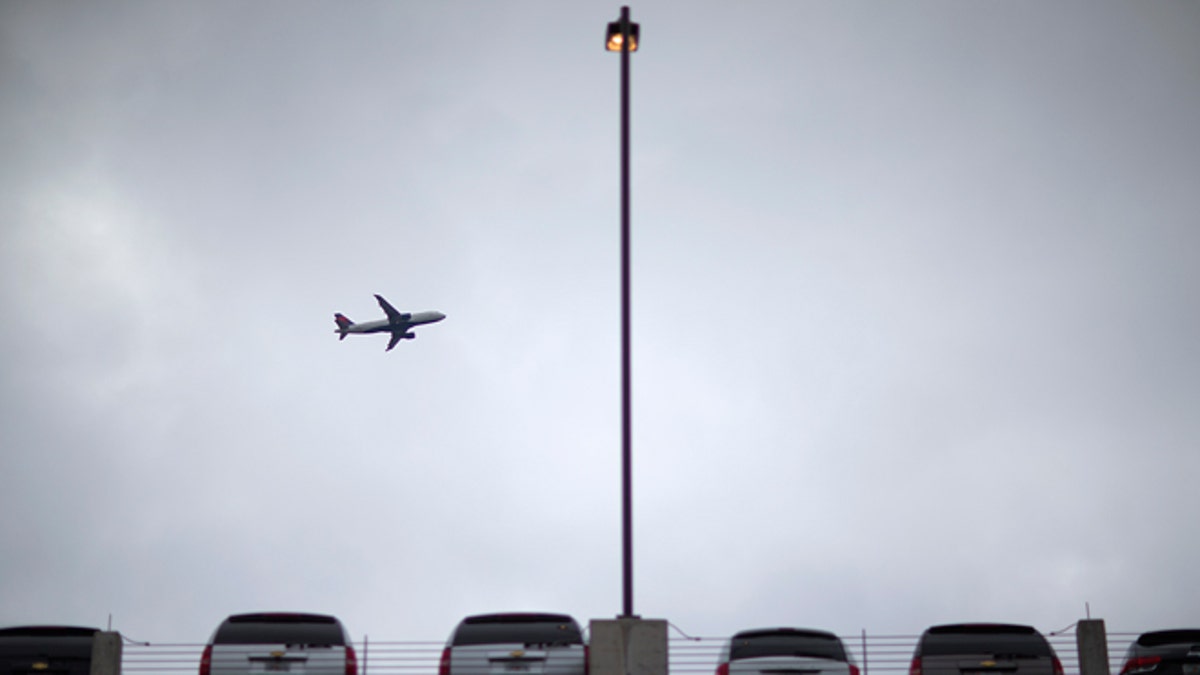
Nov. 27, 2013: An airplane takes off as rental cars sit parked at the car rental center at Hartsfield-Jackson Airport in Atlanta. (AP Photo/David Goldman)
In November, Federal Communications Commission (FCC) Chairman Tom Wheeler announced that the agency would be considering whether cell phone use for voice calls should be allowed on planes.
This follows the Federal Aviation Administration’s (FAA) October decision to allow airlines to safely expand passenger use of consumer electronics during all phases of flight.
The FAA did not change regulations regarding the use of cell phones for voice communications during flight because the issue is under the FCC’s jurisdiction. However, an FAA advisory committee did recommend that the FAA consult with the FCC to review their current rules.
[pullquote]
It makes sense to allow passengers to use their phones on planes, remembering basic courtesy. For the sake of everyone else on a plane, cell phones should be allowed for texting, email and other data communication, but not for voice phone calls except in the case of emergencies.
The brief FCC announcement has been largely misconstrued.
Chairman Wheeler did not say the FCC would allow the use of mobile phones above 10,000 feet. He simply said the agency would be exploring ways to update its existing rules on cell phone use in planes.
For some perspective, the current regulations date back to 1991, and technology has undergone massive changes since then.
There are two issues that have to be considered with the new FCC proposal.
First, many are concerned that using a mobile phone on an airplane risks interfering with the plane’s navigational system. Yet there is almost no technical evidence showing telephones cause interference. In fact, many passengers accidentally leave their phones on while flying without causing any disruption to the flight.
The second issue is whether the FCC or airlines should allow passengers to talk on their cell phones while the plane is in flight. Some international airlines already allow this.
If you’re like me and you fly a lot, you know that flying is not fun. You are cramped in a small space, you can barely move and it is uncomfortable.
Among experienced travelers, a certain etiquette has evolved to make the flying experience as tolerable as possible. In general, you try to infringe on one another’s personal space as little as possible.
Especially for those of us who fly frequently, the recent FAA decision allowing the use of personal electronics products from gate to gate was greeted enthusiastically.
In just the last few weeks, I noticed during my dozen or so flights on Delta that most passengers were already enjoying music, games, videos, ebooks or work throughout the flight.
But cellular phone use is still banned once the plane doors close. Even while the plane is sitting on the tarmac, most passengers simply tolerate phone talking – they definitely do not welcome it.
Phone talkers often loudly expose their life, problems and business to dozens of disinterested and annoyed passengers.
Often the only thing that allows other passengers to deal with it is the knowledge that once the cabin doors close, the flight attendants will require the cell phones to be switched to “airplane mode,” ceasing such communication.
In fact, a recent study by the Airline Passenger Experience Association and the Consumer Electronics Association (CEA)® found that 61 percent of airline passengers believe making cell phone calls should be restricted during flight.
Even within the consumer electronics industry, very few executives think talking on phones during flight is a good idea.
The potential for “air rage,” increased difficulties for flight attendants, and even flight disruptions is very real, although according to an FAA study requested by Congress, though no such incidents were reported by foreign aviation authorities in markets where voice calls are permitted.
However, today’s cell phones have many uses besides talking. People use them to stay in contact with friends, colleagues and loved ones by texting and e-mail.
They can be used to watch videos and follow stocks, to play games with others and keep up with the news.
While we want to avoid disrupting the flight for all passengers with noisy phone conversations, we should not shut out other connectivity opportunities for cell phones in flight.
We can hope the FCC’s December 12 meeting and subsequent investigations will find that there’s no technical barrier to cell phone use in airplanes. At the same time, any ensuing policies airlines enact must keep etiquette in mind, discouraging phone conversations while a plane is in flight.
The purpose of updating rules about personal devices in flights is to make the experience more enjoyable for all passengers.
Let’s keep it that way.
